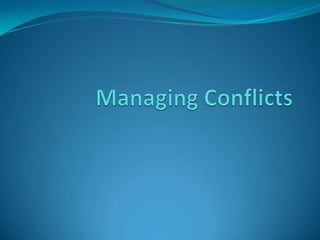
April 02 managing conflicts
- 2. Types of Conflicts Power Struggles two sides want control of a situation important beliefs and values from both sides will not agree Personality Differences people have a certain way of acting (personality) if how you act normally does not agree with how another person does, there can be conflict compromise will help lessen the conflict
- 3. Types of Conflicts… Situational Conflicts Something happens that causes one or more people to become upset. Can happen anytime, anywhere there are people interacting. The situation escalates (gets worse) when people choose not to communicate, or when people communicate in bad ways
- 4. Resolving Conflicts Acquiescence when you choose to change your behaviour to stop a conflict from continuing if the behaviour is not important OR it could easily be changed why not change it? “I have a difficult time reading when you click your pen like that. Could you stop please?” “Oh! I am sorry. I didn’t realize I was doing that. Of course I will stop.”
- 5. Resolving Conflicts… Compromise Each person sacrifices (gives up) something to reach an agreement. Often happens when a solution is close, and both sides would like to stop the conflict True compromise happens when the sacrifice is small when compared to the goal “Listen, we both want to see a movie, you want to see a scary movie, I want a funny one. Let’s make a deal, we will see the movie you want, but next week we see my movie, and you are paying for BOTH tickets, okay?” “I can handle that. Agreed.”
- 6. Resolving Conflicts… Negotiation A discussion where both sides of the conflict communicate messages to the other side Listening is equally as important as speaking The goal is for both sides to understand each other’s point of view, and reach a point where a workable solution or compromise can be found True negotiation can only happen when both sides want to solve the conflict
- 7. Resolving Conflicts… Mediation When an agreement cannot be made, negotiation and compromise fail An person outside of the conflict is asked to help unbiased neutral careful listener Mediators hear both sides in a calm discussion Suggest solutions that the conflicting people may be too upset to find by themselves (without help)
- 8. The Negotiation Process7 Steps Step 1: Define the problem listen to, show respect for both sides ensure everyone understands
- 9. The Negotiation Process… Step 2 : Identify who is affected by the problem. The person(s) negatively affected are the “owners” often, ownership is shared
- 10. The Negotiation Process Step 3: Identify possible solutions be creative, respectful think of as many as possible no bad suggestions
- 11. The Negotiation Process Step 4: Evaluate every possible solution both sides give opinions okay? not okay? make small changes to the solution if needed
- 12. The Negotiation Process Step 5: Select the best solution Often the most difficult step There may not be a “best” solution
- 13. The Negotiation Process Step 6: Check the solution Is anybody not happy with the solution? If YES, then choose a new solution (go back to step 5) If the best solution is not good enough, help might be neccessary
- 14. The Negotiation Process Step 7: Deal with failure Is finding a solution possible? If NO, then agree to disagree For bigger conflicts, this can seriously change, or sometimes end the relationship
- 15. The Negotiation Process Define the problem Identify who is affected by the problem. The person(s) negatively affected are the “owners” Identify possible solutions Evaluate every possible solutions Select the best solution Check to see if the solution is working Deal with failure
- 16. The Negotiation Process Define the problem Identify who is affected by the problem. The person(s) negatively affected are the “owners” Identify possible solutions Evaluate every possible solutions Select the best solution Check to see if the solution is working Deal with failure
- 17. The Negotiation Process Define the problem Identify who is affected by the problem. The person(s) negatively affected are the “owners” Identify possible solutions Evaluate every possible solutions Select the best solution Check to see if the solution is working Deal with failure
- 18. The Negotiation Process – 7 steps Define the problem Identify who is affected by the problem. Identify possible solutions Evaluate every possible solutions Select the best solution Check to see if the solution is working Deal with failure